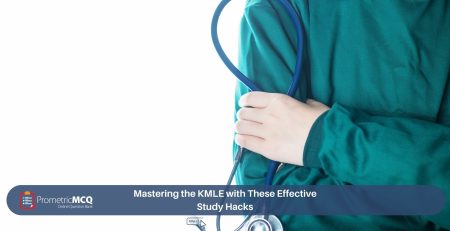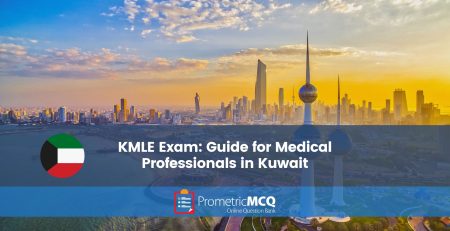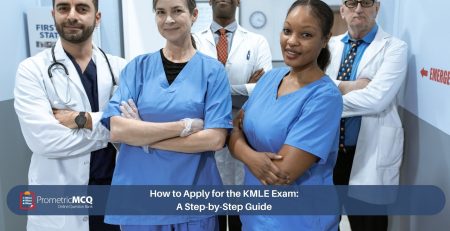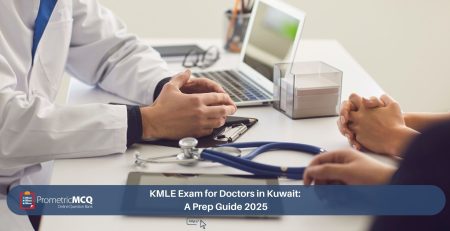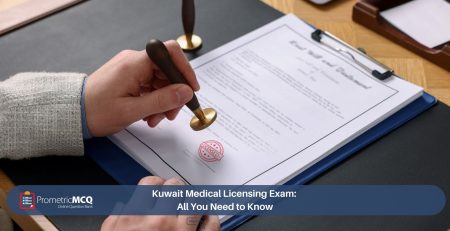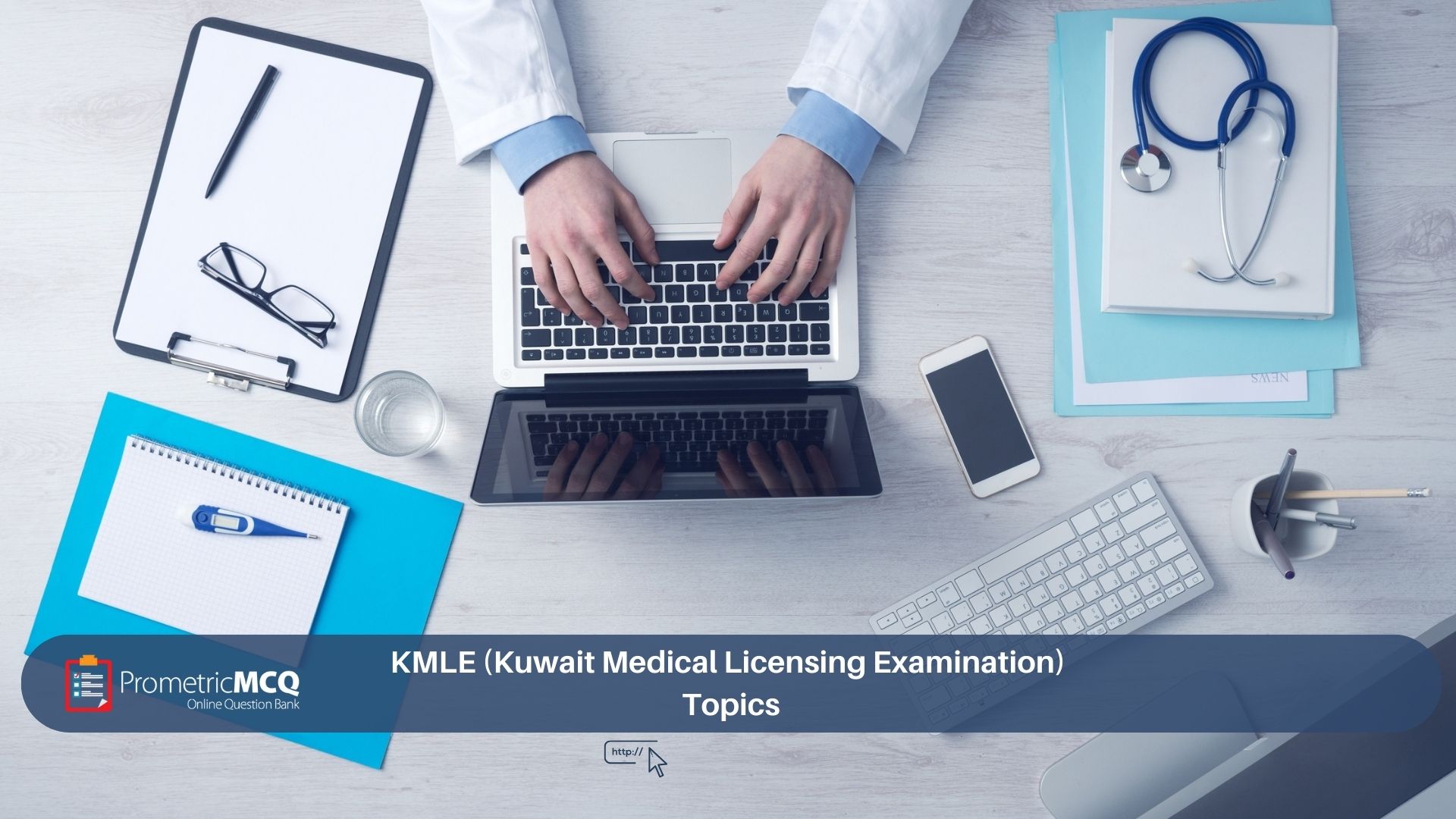
KMLE (Kuwait Medical Licensing Examination) Topics
fatima@prometricmcq.com2025-09-19T02:06:43+00:00Table of Contents
ToggleKMLE (Kuwait Medical Licensing Examination) Topics: A Comprehensive 2025 Guide
Kuwait’s healthcare system stands as a pillar of excellence in the Middle East, characterized by modern infrastructure, high standards of care, and a commitment to medical innovation. For physicians worldwide, securing a license to practice in this dynamic environment is a highly coveted career goal. The gateway to this opportunity is the Kuwait Medical Licensing Examination (KMLE), a rigorous assessment designed to ensure that all practicing doctors possess the essential knowledge and clinical acumen required to serve the community safely and effectively.
Unlike a university final, the KMLE is not a test of rote memorization. It is a sophisticated, scenario-based examination that evaluates a physician’s ability to diagnose, manage, and treat patients according to international, evidence-based standards. Success on the KMLE hinges on a deep, integrated understanding of all major medical disciplines and the ability to apply this knowledge in a high-pressure, timed setting. The foundation of this success is a thorough and strategic command of the core exam topics.
This ultimate 2025 guide has been meticulously crafted to serve as your definitive roadmap to the KMLE syllabus. We will provide an exhaustive breakdown of the high-yield topics across every major medical specialty, from Internal Medicine to Surgery, Pediatrics, and beyond. This article is more than a checklist; it is a strategic tool designed to help you structure your study plan, focus your efforts on what truly matters, and approach the exam with unparalleled confidence. Complete with a detailed 10-point FAQ, this guide is your first and most important step towards a successful medical career in Kuwait.
Key Takeaways on KMLE Topics
- Broad and Integrated Syllabus: The KMLE for General Practitioners covers the entire spectrum of medicine, including Internal Medicine, Surgery, Pediatrics, OB/GYN, and Primary Care.
- Clinical Application is King: The exam is heavily weighted towards case-based scenarios that test diagnosis, management, and patient safety, not just theoretical recall.
- Internal Medicine is a Cornerstone: A deep understanding of all sub-specialties within Internal Medicine (Cardiology, Endocrinology, etc.) is absolutely critical.
- Basic Sciences are Integrated: Knowledge of Pharmacology, Pathology, and Physiology is tested not as stand-alone subjects, but within clinical vignettes.
- Ethics and Professionalism Matter: Expect questions related to medical ethics, patient consent, and professionalism, often with a context relevant to the region.
Deconstructing the KMLE Exam Blueprint for 2025
A successful preparation strategy begins with a crystal-clear understanding of the exam’s structure and content. The KMLE is administered by Prometric on behalf of the Kuwaiti Ministry of Health. Knowing the framework is essential before diving into the specific topics. For a complete overview, review our KMLE exam guide for medical professionals in Kuwait.
Universal Exam Structure:
- Format: Computer-Based Test (CBT) consisting entirely of Multiple-Choice Questions (MCQs).
- Question Count: Typically 150 MCQs.
- Duration: 3 hours (180 minutes).
- Scoring: The exam is Pass/Fail, with no negative marking for incorrect answers.
The KMLE is designed to answer one fundamental question: “Is this physician competent and safe enough to manage the common and critical medical conditions they will encounter in a general practice setting in Kuwait?” Frame your entire preparation around this question.
An Exhaustive Breakdown of High-Yield KMLE Topics
The KMLE syllabus is vast, but certain topics and specialties carry more weight than others. The following is a detailed breakdown designed to help you prioritize your study plan. A great way to tackle this is with a dedicated set of Kuwait Prometric exam questions.
1. Internal Medicine (The Core of the Exam)
This is the largest and most important domain. You must have a robust, practical knowledge of all major sub-specialties.
- Cardiology:
- Diagnosis and management of Ischemic Heart Disease (Stable Angina, ACS).
- Heart Failure (HFrEF vs HFpEF): Diagnosis, staging, and pharmacotherapy.
- Hypertension: JNC 8 / ACC/AHA guidelines, first-line agents, hypertensive emergencies.
- Arrhythmias: ECG interpretation of AFib, SVT, heart blocks, and management principles.
- Valvular Heart Disease: Recognizing murmurs and understanding indications for intervention.
- Endocrinology:
- Diabetes Mellitus (Type 1 & 2): Diagnostic criteria, oral hypoglycemics, insulin therapy, and management of DKA/HHS.
- Thyroid Disorders: Hypo/hyperthyroidism, thyroid storm, and interpretation of TFTs.
- Adrenal & Pituitary Disorders: Cushing’s syndrome, Addison’s disease, and basic hormone pathways.
- Pulmonology:
- Asthma & COPD: Stepwise management, exacerbation triggers, and treatment.
- Pneumonia (Community-Acquired & Hospital-Acquired): Common pathogens and antibiotic choices.
- Pulmonary Embolism: Risk factors (Virchow’s triad), diagnosis (Wells’ score, D-dimer, CTPA), and anticoagulation.
- Gastroenterology:
- Peptic Ulcer Disease & GERD: H. pylori treatment, use of PPIs.
- Inflammatory Bowel Disease (Crohn’s vs. Ulcerative Colitis).
- Hepatology: Viral hepatitis serology, causes of liver cirrhosis and its complications.
- Nephrology, Rheumatology, Hematology & Infectious Diseases.
2. General Surgery
The surgical topics focus on the knowledge expected of a general physician, emphasizing diagnosis, pre-operative stability, and recognizing post-operative complications.
- The Acute Abdomen: This is a major topic. Be able to differentiate between appendicitis, cholecystitis, pancreatitis, diverticulitis, and bowel obstruction based on clinical presentation.
- Trauma Management: Principles of ATLS (Advanced Trauma Life Support), including the primary and secondary surveys.
- Surgical Oncology: Basic principles and common presentations of breast, colorectal, and thyroid cancers.
- Pre- and Post-Operative Care: Fluid management, antibiotic prophylaxis, and recognizing complications like DVT/PE, wound infection, and ileus.
3. Pediatrics
Pediatric questions focus on normal development, common childhood illnesses, and emergencies.
- Growth and Development: Know the key developmental milestones (gross motor, fine motor, language, social).
- Immunization: Be familiar with the standard pediatric vaccination schedule.
- Common Infections: Management of otitis media, pharyngitis, bronchiolitis, and gastroenteritis/dehydration.
- Pediatric Emergencies: Recognizing and managing croup, epiglottitis, and febrile seizures.
4. Obstetrics & Gynecology (OB/GYN)
This section covers the essentials of female reproductive health, pregnancy, and childbirth from a generalist’s perspective.
- Obstetrics: Routine antenatal care, screening tests in pregnancy, and recognizing major complications like pre-eclampsia, gestational diabetes, and antepartum hemorrhage.
- Gynecology: Diagnosis and management of common conditions like Polycystic Ovary Syndrome (PCOS), uterine fibroids, and abnormal uterine bleeding. Principles of contraception.
5. Integrated Basic Sciences & Cross-Disciplinary Themes
These topics are not tested in isolation but are woven into the clinical scenarios.
- Clinical Pharmacology: Mechanism of action, major side effects, and contraindications of commonly used drugs (e.g., antihypertensives, antibiotics, anticoagulants).
- Biostatistics & Epidemiology: Basic concepts like sensitivity, specificity, PPV, NPV, and understanding different study types (e.g., RCT, case-control).
- Medical Ethics: Principles of patient autonomy, beneficence, confidentiality, and informed consent.
Frequently Asked Questions (FAQs) About KMLE Topics
The core medical knowledge is identical and based on international standards. However, the KMLE is specifically designed to assess competency for general practice in Kuwait. This means it may have a stronger emphasis on primary care topics, common presentations in the region, and public health priorities relevant to Kuwait compared to the USMLE, which is more geared towards residency matching in the US.
No. You will not get a question asking you to “Name the branches of the celiac trunk.” Instead, your knowledge will be tested clinically. For example, a question about a patient with pancreatitis might require you to understand the anatomical relationship between the pancreas and the biliary tree to understand the cause.
The KMLE focuses on established, evidence-based standards of care. While you should be aware of major recent guidelines (e.g., in hypertension or diabetes), the exam will not test you on experimental or highly specialized treatments. Focus on mastering the standard, first- and second-line therapies for common conditions.
While the vast majority of the exam is based on international medicine, it is highly advisable to visit the official Kuwait Ministry of Health website. Familiarize yourself with major public health campaigns (e.g., related to diabetes or smoking cessation), vaccination schedules, and any specific regulations regarding prescribing or reporting of diseases. You can often find this information on the official Kuwait MOH website.
Internal Medicine, in its entirety, is the cornerstone of the KMLE. It forms the largest part of the exam, and its principles are relevant to questions in other sections as well. A candidate with a weak foundation in internal medicine will find the exam extremely difficult.
Emergency medicine is not a separate block, but its principles are integrated throughout all specialties. You will be expected to recognize and know the immediate management for emergencies across the board, such as acute MI, stroke, status epilepticus, DKA, and major trauma.
Use the exam blueprint as your guide. Allocate your study time based on the weightage of the subjects. Create a structured, phased study plan. Use a high-quality question bank to integrate your learning and identify your weak areas, then focus your review on those specific topics.
Yes, but the focus is on what a general practitioner is expected to know. This includes recognizing and providing initial management for common conditions like depression, anxiety disorders, and psychosis, as well as knowing when to make an urgent psychiatric referral.
The best way is through clinical correlation. When you study a disease (e.g., heart failure), also review the underlying pathophysiology and the pharmacology of the drugs used to treat it. A good QBank will help you make these connections, as the rationales often explain the underlying basic science principles.
A comprehensive question bank that is specifically tailored to the KMLE blueprint is your most valuable asset. It should cover all the major specialties and provide detailed, evidence-based rationales for each question. A wide range of resources can be found on the MCQs Packages page.
Conclusion: A Strategic Approach to a Vast Syllabus
The syllabus for the Kuwait Medical Licensing Examination is undeniably vast, but it is not insurmountable. The key to success lies in a strategic, focused, and disciplined approach. By understanding the exam’s blueprint, prioritizing the high-yield topics within each specialty, and committing to an active, MCQ-based learning strategy, you can efficiently master the required material. The KMLE is a test of a competent generalist; therefore, a well-rounded and integrated knowledge base is your greatest strength. Use this guide to build your study plan, and you will be well on your way to passing the exam and beginning a rewarding medical career in Kuwait.
Ready to Master the KMLE Topics and Ace Your Exam?
Our premium KMLE question bank provides thousands of high-yield, case-based MCQs covering every topic in this guide. With detailed rationales and simulated exams, it's the ultimate tool to guarantee your success.

